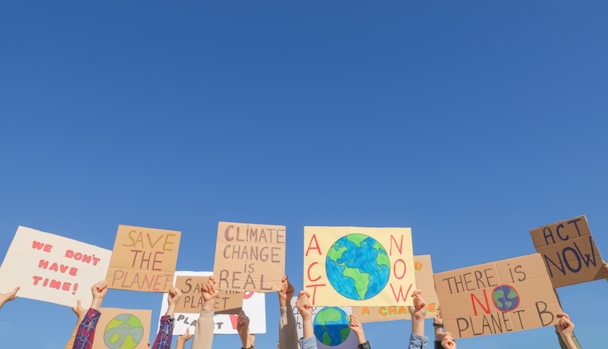Can the ad industry reach ambitious decarbonization goals under Trump’s second term?
Donald Trump’s climate plans threaten to disrupt some industry initiatives designed to mitigate carbon emissions. But leading advertising sustainability experts make the case that the private sector should stay the course.

Ad Net Zero's plans may falter under the Trump administration's priorities, according to experts / Credit: Adobe Stock
With former President Donald Trump set to return to the White House in January 2025 – backed by a cabinet that is largely hostile to climate action – some ad industry leaders and environmental advocates are questioning the feasibility of industry initiatives aimed at curbing carbon emissions.
A number of leading adland players have committed to an ambitious goal of achieving net-zero carbon emissions by 2030, under the banner of Ad Net Zero, a global initiative launched in the UK in 2020. Through the program, agencies, advertisers and vendors – including big names like Dentsu, Google, Havas, IPG, Meta, Omnicom, Publicis Groupe, PubMatic, Reckitt, Unilever, WPP and others –have been working to slash emissions from production and operations, promote sustainable practices and push for system-wide accountability.
The initiative’s five-point action plan – to reduce emissions from advertising production; promote sustainable products and services; commit to verified carbon reduction plans; educate and train industry professionals; and measure and report progress – has gained momentum internationally in the years since it kicked off.
Now, some advocates in the ad sector worry that Trump’s reelection threatens to derail key sustainability goals.
Despite concerns, the initiative’s global leadership maintains its optimism. A spokesperson for Ad Net Zero tells The Drum that it will “continue to develop tools and resources that help organizations in the advertising industry flourish in the future-facing US and global economy.”
Want to go deeper? Ask The Drum
A turning point for climate action
Trump’s climate policies, which advocate for deregulation, may impede efforts to cut back on emissions in the advertising and media space.
The Trump administration has vowed to withdraw the US from international agreements like the Paris climate accord, expand fossil fuel production and roll back existing environmental protections. The President-elect has previously referred to climate change as a “hoax” and conflated climate with weather.
Some experts believe such a landscape will intensify the need for private-sector accountability.
“If governments are going to step back, companies need to step even further forward. There’s no future for business in a world constantly disrupted by climate disasters,” says Duncan Meisel, director of Clean Creatives, a coalition of advertisers, PR professionals and their clients committed to cutting ties with fossil fuel companies.
Meisel points to the economic toll of recent climate-related events, such as hurricanes disrupting key sectors of the US economy, as a pressing example of why businesses cannot afford to put sustainability initiatives on the back burner.
Advertisement
“The urgency for climate action doesn’t come from governments or activists – it comes from the planet,” he says. “If you’re not accounting for your company’s impact on this defining issue, you will be left behind.”
Others agree that now is the time for businesses to act as responsible stewards of the environment. “The advertising industry has a critical role to play in addressing the climate emergency, and initiatives like Ad Net Zero remain essential, even under a Trump administration,” explains Junelle Cavero Harnal, head of political at multicultural media company My Code.
“While the regulatory and federal landscape may shift, with the US withdrawing from the Paris Agreement and climate change no longer being a top federal priority, the responsibility to decarbonize advertising operations and promote sustainable behaviors does not diminish,” adds Harnal.
Are there holes in the Ad Net Zero message?
While Ad Net Zero’s five-point action plan has drawn praise for its comprehensive framework, opinions vary on whether its ambitious goals can withstand the challenges posed by shifting political priorities and escalating climate crises.
My Code’s Harnal, for one, remains optimistic. “The advertising industry has a critical role to play in addressing the climate emergency, and initiatives like Ad Net Zero remain essential, even under a Trump administration,” she says. My Code, she explains, continues to aligning its operations with Ad Net Zero’s goals by decarbonizing production, distribution and media planning.
Advertisement
Others, however, are more skeptical. Michael Hanbury-Williams, UK managing director at Greenbids, a company focused on reducing the carbon footprint of programmatic advertising with the help of AI, sees potential vulnerabilities within the five-point action plan. “Some points will take more of a hit than others following Trump’s election,” he says. “Action 1 – ‘reduce emissions from advertising business operations’ – will likely suffer as companies feel less inclined to set ambitious targets.”
Meanwhile, Action 5, which pledges to “use our ability to support more sustainable behaviors,” could become “less of a priority as organizations question the point of putting out messaging that encourages sustainable behavior changes not backed by the government.”
For Clean Creatives’ Meisel, the initiative’s credibility faces more fundamental challenges. “The Ad Net Zero project... should see itself as being on reputational life support at this point,” he argues. “The goals that they set out for themselves don’t match the moment already, and in the context of governments stepping back from their obligations, they are even more at risk of being seen as completely irrelevant to the future of the climate.”
The legitimacy of the Ad Net Zero initiative is hampered by participating organizations’ ongoing commitments to fossil fuel clients, Meisel argues. “The Ad Net Zero members have dozens and dozens of fossil fuel clients among them. Trying to come to the table as a body with real aspirations of leadership, while having WPP – with its 70-plus fossil fuel connections – you don’t get any credibility out of that,” he says.
Nonetheless, Meisel believes Ad Net Zero could intervene with more stringent requirements for members. “If they’re able to step up and address the elephant in the room, they could have a window of opportunity to be seen as meaningful leaders. But if they stay on the current path, I think this poses a real threat to their ability to do their work.”
The private sector’s call-to-action
In the lead-up to Trump’s return to the Oval Office, public pressure for meaningful climate action is mounting.
The planet is on track to record its warmest year in history in 2024, according to NOAA’s National Centers for Environmental Information. Meanwhile, devastating events, including flash floods in Spain, wildfires in Chile and hurricanes in the US, have fueled protests around the world, from a global climate strike in September to localized demonstrations demanding better flood management in Spain this month.
“We are off track; leaders are not stepping up, and people need to pile on the pressure,” says Hanbury-Williams. “We all saw what happened in Spain... with the protests against the local government’s failure to adequately protect its people after the flash floods. Expect more of this around the world very soon.”
Suggested newsletters for you
Meanwhile, as diplomats, scientists and activists debate solutions at Cop29 in Baku, Azerbaijan this month, reports indicate that efforts to keep temperatures within 1.5 degrees Celsius of pre-industrial levels have failed at scale.
Irrespective of the decisions the Trump administration will make over the next four years, many companies remain incentivized to prioritize climate action, as consumer demand for sustainable practices continues to grow. Today, younger generations are 27% more likely to support brands that demonstrate care for their impact on people and the planet, according to research from Harvard Business Review.
This reality should serve as a call-to-action for the private sector, Hanbury-Williams suggests. “Companies that double down on their climate vision will gain market share and customer loyalty, positioning themselves as true leaders in the sustainability space,” he says.
Ad Net Zero, for its part, believes it has established a strong model for supporting business growth. A spokesperson says the initiative “is pro-business and pro-growth, with research showing that, irrespective of region or market, doing business sustainably can simply be better business.”
Beyond the financial opportunity at hand, some believe it’s the responsibility of the business world – including the ad industry – to take the lead where regulatory action and policy fall short. “Even amid an uncertain regulatory environment, businesses must rise to the occasion, meeting both the market’s expectations and their own internal sustainability goals,” Harnal says.
Of course, the path toward widespread decarbonization in the ad industry – and in the private sector at large – will not be without obstacles.
“It’s naive to think the transition towards a ‘greener’ society will be a simple upward trajectory,” says Hanbury-Williams. “Setbacks – like those we can expect to encounter from Trump’s administration – are inevitable, and things often have to get worse before they get better.”
Even so, he says he’s ”hopeful that [Trump’s] presidency will serve as a wake-up call to those in the private sector, and citizens more generally, to get more involved with climate change policies – not less.”
For more, sign up for The Drum’s daily newsletter here.
